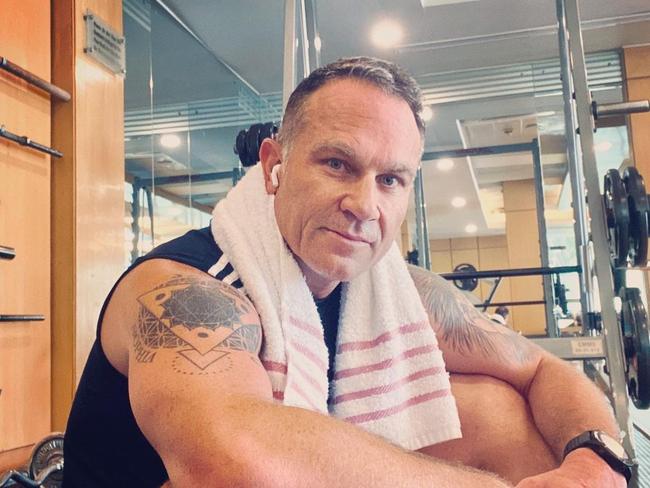Michael Slater: Rise and fall of former Test cricket and TV star
He was one of the most destructive batters in world cricket and a popular TV personality. These days Michael Slater is facing new challenges. HIS RISE AND FALL
Police & Courts
Don't miss out on the headlines from Police & Courts. Followed categories will be added to My News.
He was once known as one of the most destructive batters in world cricket and a popular TV personality.
These days Michael Slater is confronting off-field allegations, as well as facing a public mental health battle.
This is the story of the rise and fall of the former Australia Test star, now 52.
EARLY LIFE
Michael Jonathon Slater was born in famous sporting production town Wagga Wagga, NSW, on February 21, 1970.
After his parents, Peter and Carole, emigrated from England in 1966, the couple settled in Tasmania initially before moving to Wagga Wagga three years later.
In that time Carole would give birth to Slater and his two older siblings, Julian and Tracey.
“Wagga Wagga was a great place to grow up, for many reasons,” Michael Slater would later write.
“It was a good size – it had a population of around 50,000 when we moved there – and it was in the country, with a great Australian climate.”
After Carole left the family when Slater was 12, he would later outline the struggles he faced, admitting sport was the “only thing (he) could focus on properly”.
This also came at a time of bullying, with Slater revealing he once ran home from school because other students “were planning to get (him)”.
SPORTING LIFE
Sport, of any sort, was a perfect fit for Slater.
“My family was always involved in sport, so from an early age it just seemed natural for me to play any game that was on offer,” he once wrote.
At 11 Slater was selected in the NSW Primary School Sports Association cricket and hockey teams.
After making the state under-12, 13, 15 and 17 hockey sides, an Achilles tendon injury when aged 17 threatened to scupper Slater’s sporting plans.
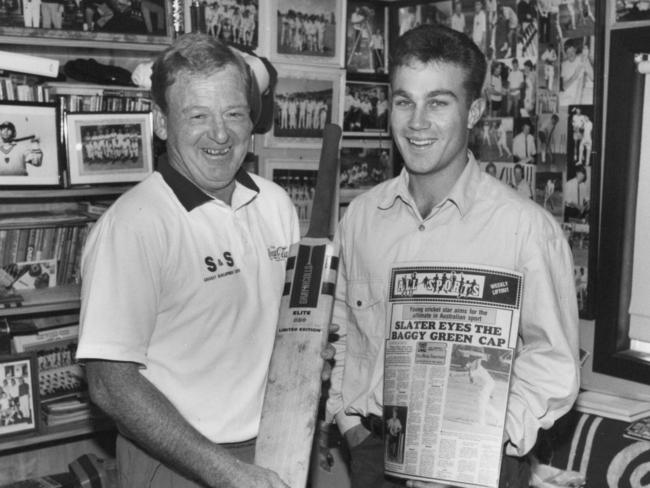
Despite facing surgery, Slater would ultimately overcome his injury and turned his focus solely to cricket.
Slater caught the eye of big Sydney clubs as he progressed to attend the Australian Institute of Sport Australian Cricket Academy in 1989.
He captained NSW’s under-19 team at the national championships in Brisbane, returning 12 months later as vice-captain in a more successful, title-winning campaign for the state.
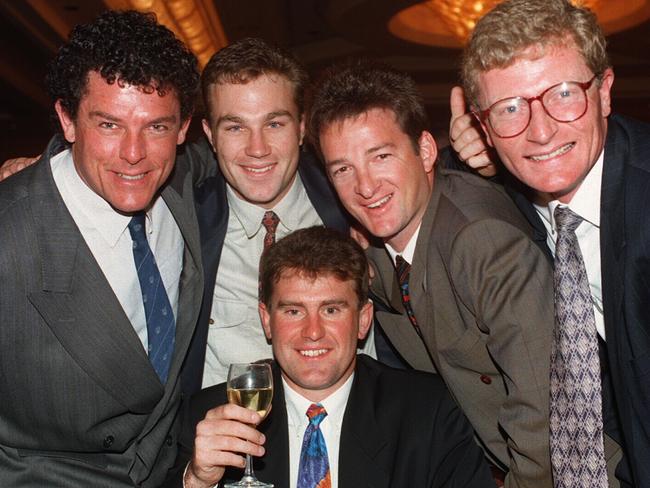
CRICKET STARDOM
The rise was as quick as the footwork that got him there.
Slater, armed with a carefree swashbuckling batting style, rose from NSW Second XI newbie to Ashes selection bolter within 12 months in 1992/93.
A 58 on Test debut, while battling alongside long-time partner Mark Taylor, quietened talk surrounding Slater’s ascent ahead of rising Queensland opener Matthew Hayden.
A brilliant 152 in the second Test shut the door on rivals for the next three years.
Following a golden run of form in 1995/96, including a Test-best 219 against Sri Lanka, Slater was somewhat surprisingly dropped against India, with his wild early slash and dismissal appearing to lose the patience of selectors.
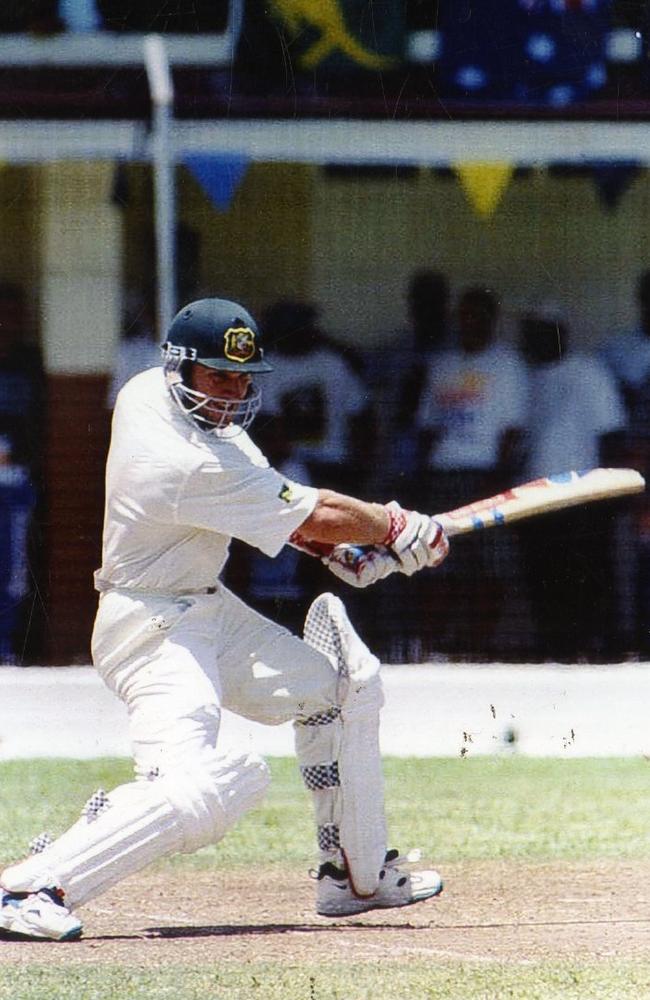
At the time he’d played 34 Tests with seven centuries and an average of 47.41.
Out of the side for 18 months, Slater returned in 1998 and would go on to finish with 74 Tests and an average of 42.83, with 14 tons.
He was ultimately dropped following a prolonged form slump culminating in the 2001 Ashes.
Slater’s signature move was kissing the Aussie badge on his helmet when reaching triple figures, though he was equally known for being dismissed in the 90s on a record nine occasions.
Despite his brave batting style, Slater was a modest performer at one day international level, with his 73 on debut in 1993 remaining his top score across 42 matches.
Amid scrutiny on his professional and personal life, Slater’s career petered out over the following seasons before retiring in 2004.
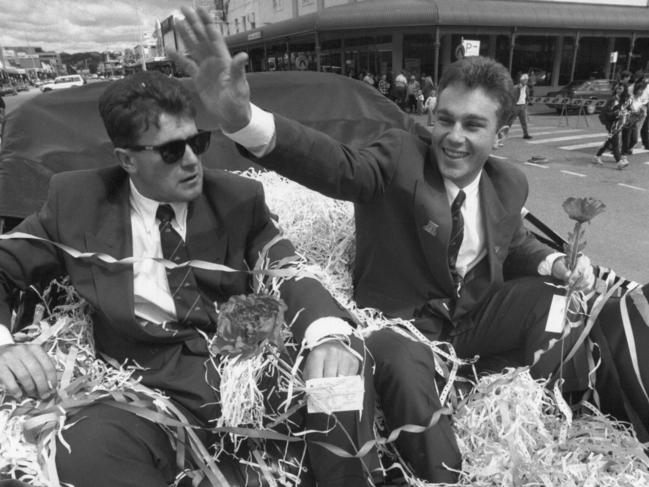
CONTROVERSIES
Catch controversy
Slater in 2001 apologised to Rahul Dravid for using abusive language against the Indian vice-captain during the first cricket Test between the two countries.
Slater’s tantrum began after his appeal for a catch against the batter was turned down by the third umpire.
In what Peter Roebuck described as “Slater’s moment of madness”, the fiery opener approached umpire S Venkatraghavan and argued the decision with him.
Slater then turned to Dravid, who stood his ground, and exchanged words with him.
Australian captain Steve Waugh later conceded Slater’s behaviour was wrong but Slater and Dravid would later share a beer after the match.
Slater was let off with a warning over the unsavoury incident.
Drug denial
In 2005 Slater addressed rumours he had used cocaine in 2001 before a tour to India.
Slater told Andrew Denton’s Enough Rope program how then Cricket Australia boss Malcolm Speed questioned him about his drug use at the time.
“You go back to your so-called reliable source and tell him he’s not so reliable, because drugs have never been a part of my life, will never be a part of my life. It’s just something I will never stand for,” he said in 2005.
Pay dispute
Cricket’s pay dispute of 2017 got personal for Slater, who publicly took the side of administrators.
He and former Test opener Ed Cowan went at it on Sydney radio in July in a spicy debate about the ongoing pay dispute between Cricket Australia and the unemployed players.
A day later former Aussie paceman Mitchell Johnson joined in, citing Slater’s love of fast cars during his playing days.
“@mj_slats if you think it’s about money then you have no idea what you’re talking about!” Johnson tweeted .
“The players past & present need the ACA’s support for the future of the game for many reasons.
“Yes a fair share is part of it & its disappointing a past player doesn’t support the players.
“I bet @mj_slats would be on the players side if he was still playing #Ferrari.”
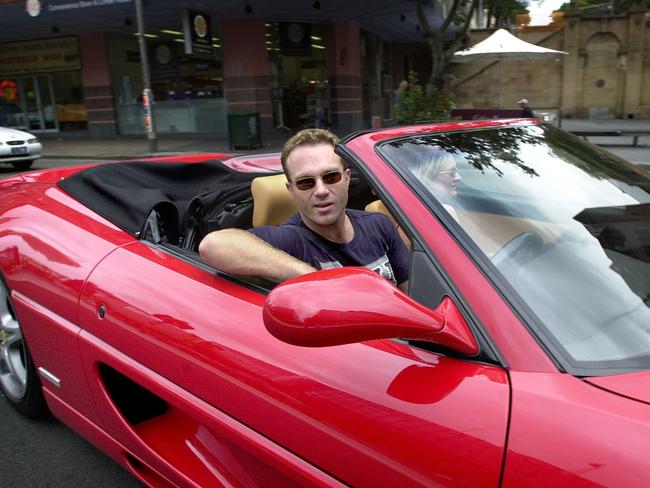
Plane drama
Slater’s removal from a Sydney domestic flight in 2019 after a ‘heated argument’ with friends somewhat kickstarted his career decline
Slater was booted from the Qantas regional flight before it was due to depart Sydney for Wagga.
Macquarie Radio digital content producer Nick Fergus told Ray Hadley on 2GB Slater was removed after an argument with two female friends began to escalate.
“He’s been involved in an extremely heated argument — this has been described as not a run of the mill argument — it was yelling, it was swearing and it was only getting worse as they moved to their seats,” Fergus said.
Slater issued a statement to Macquarie Radio which read: “I did have an argument with two friends while boarding a flight to Wagga and I apologise for the inconvenience this caused other passengers on the flight”.
The incident followed reports at the time Slater was on the outer at the Seven Network, a claim denied by the cricketer.
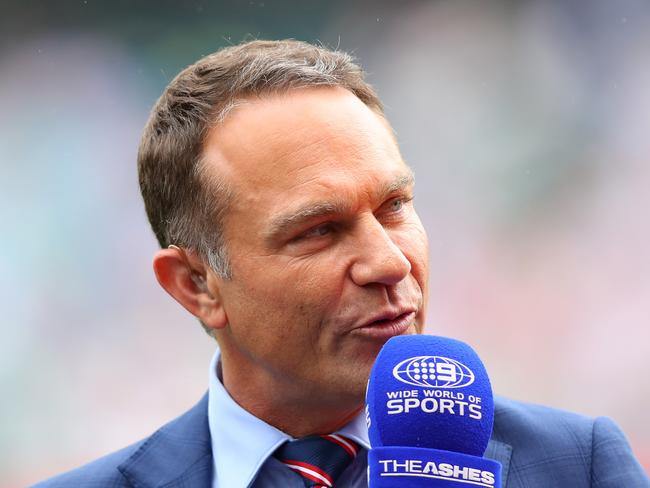
Warner ‘war’
David Warner and Slater in May 2021 furiously denied a report they had an altercation in the Maldives.
The pair were staying at the Taj Coral Resort in the Maldives having flown from India and the IPL tournament to escape the coronavirus crisis that forced the tournament to be postponed.
Sources said the pair had a disagreement and physical exchange in the bar late at night.
Slater told The Sunday Telegraph in a text at the time: “There is absolutely nothing to the rumour mill Buzz. Davie and I are great mates and absolutely zero chance of (having) a fight.”
Warner said: “There has been no drama.
“I don’t know where you get these things from. Unless you were here and have got concrete evidence you can’t write anything.”
“Nothing happened.”
ScoMo claims
Then Australian Prime Minister Scott Morrison in May 2021 was forced to respond to scathing social media claims from Slater amid the Covid drama.
Slater, who had been commentating on the IPL, said Scott Morrison had “blood on his hands” after banning flights from India.
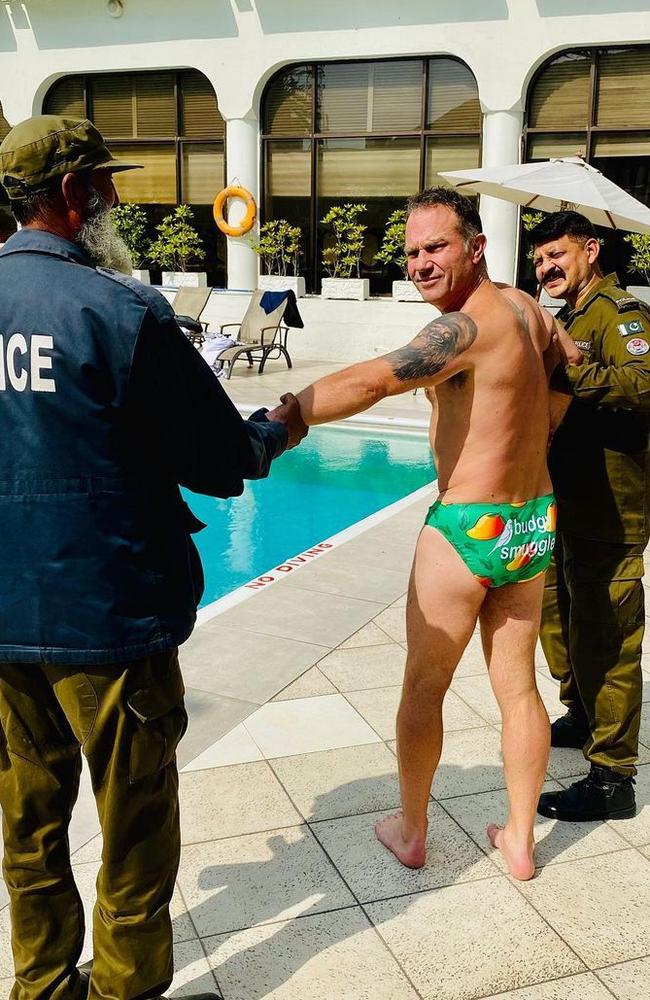
“It’s a disgrace! Blood on your hands PM. How dare you treat us like this,’’ he tweeted.
“If our Government cared for the safety of Aussies they would allow us to get home. It’s a disgrace!! Blood on your hands PM. How dare you treat us like this. How about you sort out quarantine system. I had government permission to work on the IPL but I now have government neglect,” he tweeted.
“And for those who think this is a money exercise. Well forget it. This is what I do for a living and I have not made a penny having left early. So please stop the abuse and think of the thousands dying in India each day. It’s called empathy. If only our government had some!”
Morrison responded to the remarks days later, denying he was responsible for the deaths of Australians.
When asked on Nine if he had “blood on his hands,” Mr Morrison replied: “No, obviously that is absurd.”
TELEVISION
With his playing days over, the popular Slater took a role commentating for Channel 4 in the United Kingdom during the 2005 Ashes series.
Within a year he joined Nine’s Wide World of Sports cricket commentary team, soon adding a regular spot on Channel 9’s health and lifestyle program, What’s Good For You?.
From 2009 to 2010 he was the sports presenter for the Nine Network’s Weekend Today alongside co-hosts Cameron Williams and Leila McKinnon.
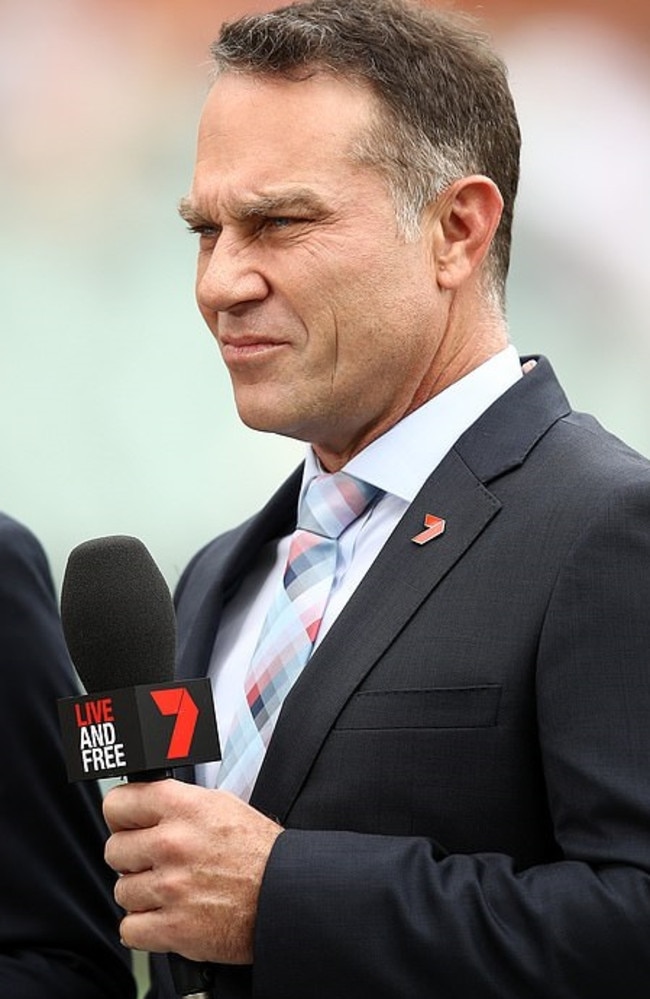
During that time he also hosted Australia’s Greatest Athlete, before his biggest TV break.
He was chosen as co-host of The Footy Show alongside Paul Vautin, Darryl Brohman, Erin Molan and Beau Ryan, and host of The Cricket Show.
Slater soon landed a role calling the diving at the 2012 Summer Olympics in London for Channel 9 and Fox Sports.
With Seven scooping cricket coverage in 2018, Slater jumped ship to commentate on Test matches and the Big Bash League.
After his war of words with Scott Morrison, Slater was axed by the Seven Network which chose to not renew his contract, citing “budget restraints”.
HEALTH ISSUES
In 2005 Slater opened up on his bipolar disorder.
He told ABC’s Enough Rope that he feared the worst when he first experienced the severe symptoms of a mental condition that causes rapid mood swings.
“I felt that every day I was going to die,” Slater said.
“Every day was my last day. That’s how drastically it affected me.”
Slater’s first panic attack came when he was still playing Test cricket and was sparked by his debut as a commentator in England in 2000.
“I was so nervous, so uptight about it, and after the first day’s commentating, I thought I’d done an absolute crap job,” he said.
“So I came back to my hotel and I didn’t feel great, and then bang, that night I had my first ever full-blown panic attack, was rushed to hospital, thought I was having a heart attack.”
Slater returned to a Sydney hospital in April 2022 as domestic violence charges against him were dismissed on mental health grounds.
Barrister Richard Pontello at the time told the court that Slater was suffering several mental illnesses including major depressive disorder and ADHD at the time of the offending, but was in remission.
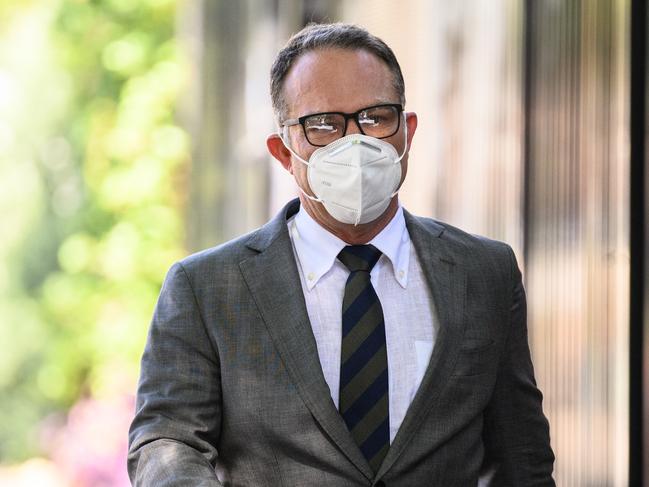
He previously told the court that Slater had spent 108 days in a rehabilitation facility from January to March in 2022.
Magistrate Ross Hudson described Slater’s behaviour as him “unravelling” and signs of his mental health deteriorating.
He noted Slater had sought treatment for his mental health.
“He has a significant illness and has done significant work since that period of time, and he should be proud of that,” he said.
In May 2023 Slater pleaded not guilty at his first appearance in court after being charged with assaulting a police officer.
The 53-year-old had been charged with one count of assault police and two counts of obstruct police, following an incident at Noosa Heads on Friday, March 31.
He used the appearance to talk openly about his mental health struggles.
